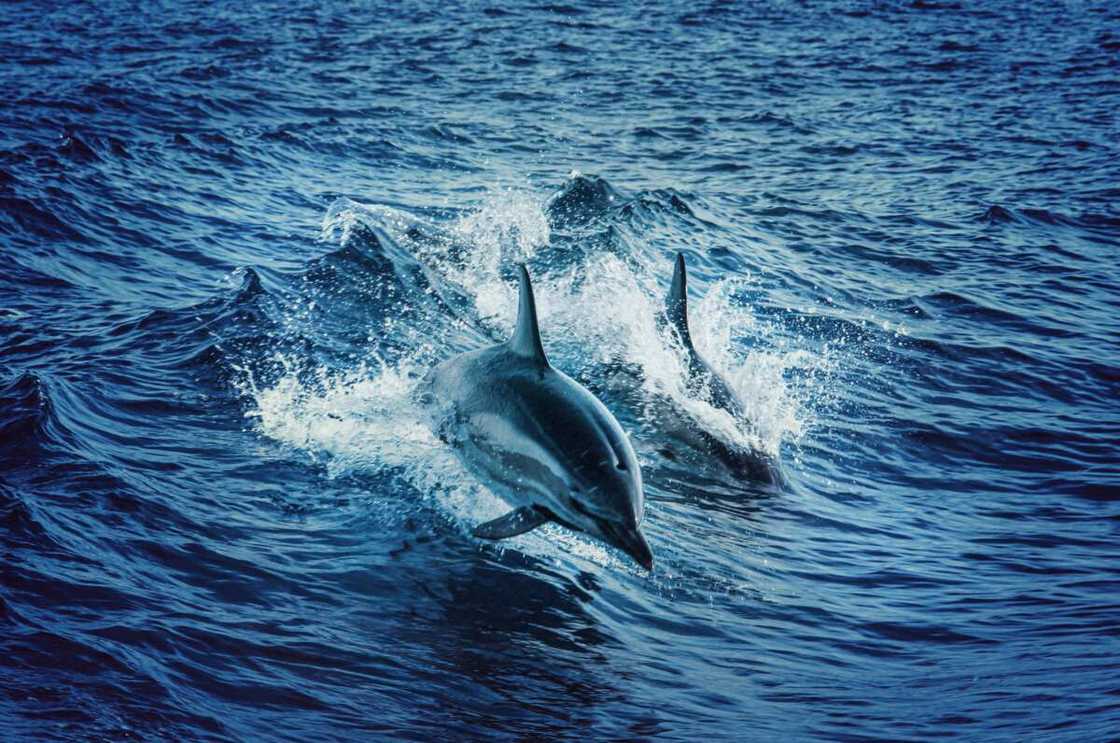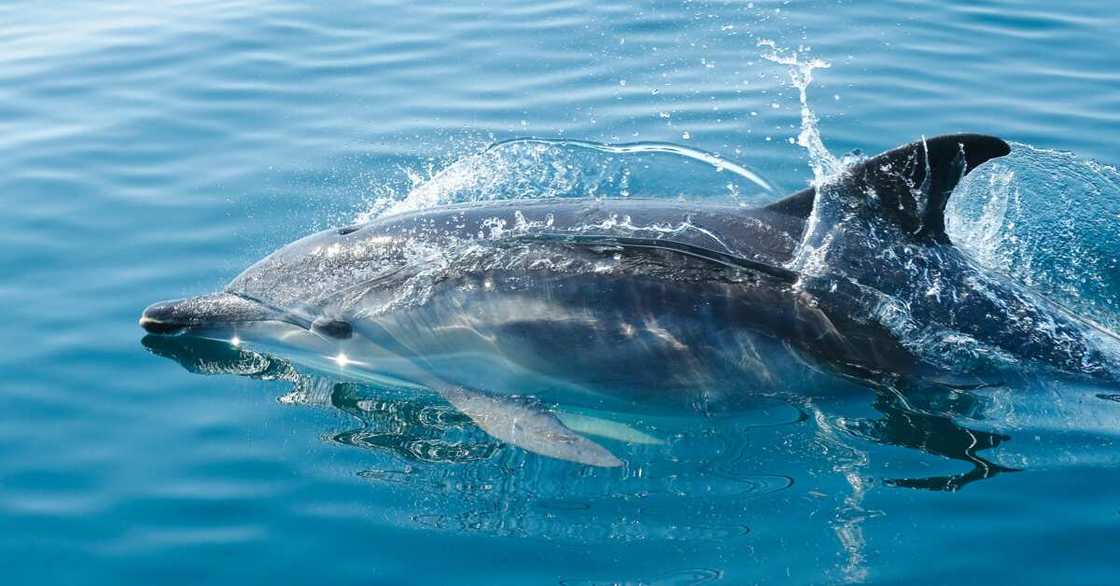Dolphins are sea animals that are greatly intelligent, skilled, joyful and playful creatures. They are said to share similar emotional feelings with human beings. Regarding their species, there are over 30 different species ranging from various sizes. They are known to be very close to human beings. But are dolphins dangerous? Dr. Bruno Diaz López, the Founder, Director, and Chief Biologist at The Bottlenose Dolphin Research Institute (BDRI), shared vital information about dolphin behavior, the risks associated with human interactions, and essential safety precautions to consider if you ever encounter one.

TABLE OF CONTENTS
- Are dolphins dangerous?
- Common behaviors dolphins exhibit when threatened or agitated
- Have dolphins attacked humans? What triggers these reactions?
- Safety precautions for interacting with dolphins in the wild
- Are dolphins dangerous to other animals?
- Are dolphins considered fish?
- What makes dolphins intelligent?
- How many species of dolphins are there?
- Are dolphins dangerous to swim with?
- Known fast facts about Dolphins
- Are dolphins mean?
- Are dolphins vicious?
- Are dolphins aggressive to humans?
- Is it safe to swim out to dolphins?
- What are the differences between porpoises and dolphins?
Dolphins are sea mammals known for intelligence, social behavior, and acrobatic abilities. They are known to perform tasks ranging from categorising objects, mimicry, and even recognising themselves. How friendly are they to humans and other animals?
Are dolphins dangerous?
Are dolphins friendly? When thinking about the dangerous aspect of dolphins to humans, they are friendly. They are very friendly and are often associated with positive interactions with humans.
Nevertheless, it is essential to be careful when around them. Like any other sea creature, dolphins have powerful bodies and sharp teeth. They can become aggressive in certain situations.
Wild dolphins may exhibit territorial behavior, especially when protecting their young or pod. In rare cases, there have been reports of dolphins behaving aggressively towards humans, but such incidents are uncommon.
Common behaviors dolphins exhibit when threatened or agitated
Dr. Bruno Diaz López, the Founder, Director, and Chief Biologist at The Bottlenose Dolphin Research Institute (BDRI), explained in an interview how dolphins react when they feel threatened or agitated. He said although dolphins are generally not aggressive, they can become aggressive toward other dolphins or animals. Dr. López explains:
Dolphins can react in different ways. The bottlenose dolphin, the most common species found along coastlines—including in Nigeria and other parts of the world—exhibits behaviors similar to other dolphin species.
While there are different species of dolphins, their reactions are often quite similar, especially when interacting with other dolphins. They may bite, hit, or flee, especially considering their size.
Depending on the species, dolphins can grow to over 2.5 meters in length and weigh more than 200 to 300 kilograms, making them potentially dangerous in certain situations.
Have dolphins attacked humans? What triggers these reactions?
While dolphins are known for their friendly character, Dr. López says there have been situations where human interactions have triggered aggressive behavior. He explained:
When dolphins are solitary, they sometimes begin interacting more regularly with humans. This is common in certain bays where isolated dolphins, or a few individuals, may engage with people, often because humans feed them. These interactions usually start due to human behavior, as feeding the dolphins encourages regular contact.
The problem with these situations is that dolphins are wild animals. Under normal conditions, they would not attack or show aggression toward people. However, when their behavior is altered by human activities such as feeding or petting, dolphins can become accustomed to human interaction and, in some cases, may become dangerous.
There have been instances around the world where people have been injured while swimming with dolphins or engaging in other activities. Dolphins are large, powerful animals whose size and strength can pose a risk.
Safety precautions for interacting with dolphins in the wild
Dr. López shares essential safety precautions to take when interacting with wild dolphins. He said:
- Avoid interactions with them:
The first rule is to avoid interacting with dolphins. Many countries, such as the U.S., Spain, and Canada, have laws prohibiting swimming with dolphins. This is to protect both the dolphins and people, as it can be dangerous for both.
- Avoid touching them and keep your distance:
If you encounter dolphins in the wild, it's important not to touch them. I've worked with dolphins underwater and have never touched them. You should never touch a dolphin because doing so can cross a boundary.
Once they become accustomed to human contact, their behavior can change, and they may react unpredictably. It's always best to keep your distance from wild dolphins.
Are dolphins dangerous to other animals?
Just like they are to humans, they are also very friendly to other animals apart from their predators. These mammals can be territorial in the wild, particularly when protecting their young or defending their pod.
Also, depending on the species and prey, dolphins might employ various techniques to subdue their targets, including ramming, tail-slapping, and herding.
Are dolphins considered fish?

Dolphins are not fish but can swim conveniently in water without any struggle. They are mammals and precisely carnivores. Their diet varies depending on the species and location but typically includes fish, squid, and crustaceans.
What makes them mammals? This is because of various factors such as being warm-blooded, breathing through lungs, not gills, giving birth to live young, and producing milk for their young.
What makes dolphins intelligent?
Unlike the dumbest animals on earth, these sea creatures are also considered some of the world's best and most intelligent animals. They have a large brain, which suggests a more significant potential for complex cognitive processes.
The brain is highly developed with a large and well-developed neocortex. This neocortex is associated with higher-order brain functions, such as problem-solving, self-awareness, and advanced sensory perception.
These sea creatures know how to socialize well with human beings and have good communication abilities. They use a variety of vocalizations, clicks, and whistles to communicate with each other.
They can also learn various tools, respond to symbols and even exhibit a form of self-awareness, as seen in mirror self-recognition tests. While communicating, they make squeaks, buzzes, whistles, and click sounds. This enables them to bond with each other uniquely.
How many species of dolphins are there?

There are 40 extant species named dolphins. These species may vary in terms of behavior, habits, and appearance. Many are grey, some species have various patterns of black and white, and a few are even pink. Some common examples include:
- The Amazon River dolphin: This species is found in the Amazon River, a freshwater river. In most cases, their skin turns pink as they mature.
- The Ganges river dolphin: These species are also found in freshwater rivers in India. They have a unique habit of swimming sideways, allowing it to sidle up to food.
- Commerson's dolphin: This species is found off the coast of Argentina and in parts of the Indian Ocean. It's best known for its panda-like black-and-white colour pattern.
- Risso's dolphin: This type of species loves deeper waters.
- Killer whales: These are the world's largest dolphins. They typically have a bold black-and-white pattern similar to Commerson's dolphin.
- Spinner dolphins: Spinners are known for high jumping spins they take out of the water. They are found throughout the world, preferring warm and shallow waters.
- The Striped Dolphin: These dolphins are attractively striped and can live in large groups. They perform elaborate acrobatics when they leap into the air.
Are dolphins dangerous to swim with?
In most cases, dolphins are not dangerous, becoming very friendly to swim with. Most of these mammals are trained in controlled environments such as marine parks; in most cases, you can swim with them without fear.
Known fast facts about Dolphins
Here are some of the fun facts about dolphins you ought to know.
- They are graceful, sleek swimmers that can reach more than 18 miles an hour.
- Underwater noise pollution is a real threat to dolphins.
- The Amazon River is home to four species of river dolphin found nowhere else on Earth.
- Their gestation period spans from nine to sixteen months. The mother gives milk to her children. Sons and daughters of resident orcas remain with their mother's family for the rest of their lives.
- They consume crabs, squid, and fish. Before swallowing, they may break the meal into tiny bits rather than chewing it.
- For smaller dolphin species like orcas, these mammals can live up to 20 years, but for larger dolphin species, their lifespan can reach 80 years or longer.
- The bottlenose dolphins are relatively slow swimmers, traveling at about two mph. They can, however, reach speeds of over 30 mph for brief periods.
- They produce bubbles when hunting. This enables them to herd their prey to the surface. They sometimes also use their tail to hit fish and stun them - making them easier to catch.
- They sleep with one half of their brain at a time while keeping an eye open. They do this to stick together and to look out for predators like sharks.
- Fishing gear is a significant threat to dolphins. Anglers can attach acoustic alarms, or pingers, to fishing nets to avoid this.
- Their teeth are perfect for grasping food, but they aren't made for chewing at all.
- They may eat between 17 and 35 pounds of food a day.
- They stick with their mothers for a long time.
- They have two stomachs. One is used for food storage, and the other for digestion.
- They are known to be great divers. They can dive up to 1,000 feet underwater.
- They help the sick and injured members of their groups.
- Killer whales belong to the dolphin family. They reach up to a length of 30 feet and are the biggest of their kind.
- They can migrate if their food needs are not met. They will move to places with enough food and the climatic conditions that suit their body temperatures.
- Their delicate skins get injured at the slightest touch of a hard surface. Due to their fast healing attribute, even the deepest wounds can be healed quickly.

Are dolphins mean?
In some situations, dolphins have been known to attack humans and other marine mammals when they feel threatened or are highly stressed, which may make them look mean.
Are dolphins vicious?
They are not inherently vicious. They are known for their curiosity and often approach boats or interact with swimmers.
Are dolphins aggressive to humans?
Those who have encountered them rarely face any harm or discover any signals of feeling any danger. They can attack humans in certain situations
Is it safe to swim out to dolphins?
Is there a dark side to dolphins? This can only be safe under the guidance of a professional. Sometimes, they may attack you thinking you are prey, but in rare occasions, for instance, when they sense fear and when stressed.
What are the differences between porpoises and dolphins?
Porpoises are more diminutive than dolphins. They are less than 2.5m (8ft) long. The two also have different tooth shapes.
Beneath the sun-kissed waves, curiosity meets caution. Are dolphins dangerous? This may vary depending on various factors, such as when they spot a predator. But generally, they are considered one of the most friendly mammals and do not cause harm to humans.
Legit.ng recently published an article about the common birds and their spiritual meaning. Birds are widely regarded as symbols of freedom and eternity due to their ability to soar into the skies. Bird symbolism exists worldwide in different cultures, religions, and traditions.
Every bird is uniquely breathtaking and symbolizes certain aspects of our lives, nature, and the unknown world. Bird symbolism associates birds with infinite possibilities, renewal, eternity, and the transition between life and death.
.. Source: Legit.ng




